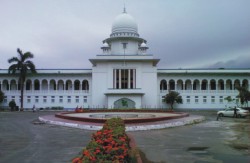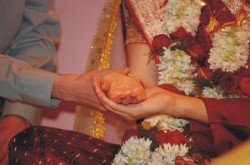Judgment Review
Judgment of Appellate Division
Presumption of a valid marriage
Tanzim Al Islam
 |
Photo: panoramio.com |
Appellate Division has delivered a milestone judgment regarding the validity of Marriage under Muslim Law . In Momtaz Begum VS Anwar Hossain case Appellate Division has established that if Muslim man and women live as husband and wife together for a considerable time and there is not any registered kabinnama between them the legal marriage can be consummated and it can be treated as valid marriage. Experts say that the Judgment has removed the abstractness about the validity of Muslim Marriage and it has established the concept of Muslim Marriage under Mohammedan Law. Justice S.K.Sinha has delivered the judgment on 31 July 2011.All justices of Appellate Division agreed with him.
Momtaz Begum instituted a suit against Anowar Hossain for dower and maintenance in the Family Court. She claimed that though their marriage was solemnized according to Mohammedan Law, the Kabinnama was not registered. They lived as husband and wife together for a considerable time and the marriage was duly consummated. With the passage of time Anwar Hossain became more greedy and started demanding dowry from her and at one stage he drove Momtaz away from his house. Anwar contested the suit denying the marriage. The Family Court on assessment of the evidence of witnesses came to the definite finding that Anwar Hossain married Momtaz Begum and that they lived as husband and wife, and decreed the suit. The Court of appeal below affirmed the judgment. A single Bench of the High Court Division in exercise of revisional jurisdiction reversed the judgments of the courts below and dismissed the suit.
The High Court Division held that there is no material to show that the marriage between the parties was solemnized after fulfillment of requirements laid down in paragraph 252 of the Mohammedan Law, that Momtaz Begum having failed to prove the marriage by examining competent witnesses her claim of marriage falls to the ground and that mere living together did not bring her within the bounds of marriage. The High Court Division, in its judgment treated the parties cohabiton as live together and stated “Now-a-days the obnoxious alien culture of living together has made its in-road into our society and this slowly is spreading its tentacles undermining our social value and the institution of marriage”.
 |
Photo: wunrn.com |
Momtaz begum has filed an application for leave to appeal against the judgment of the High Court Division. Leave was granted by considering three grounds, as to (1) whether non-registration of the marriage under Mohammedan Law makes the marriage illegal or irregular or non-existent, (2) whether continuous co-habitation by the appellant and the respondent over a period of three years as husband and wife coupled with their conduct infer a presumption as to the legal marriage, and (3) whether the High Court Division is justified in interfering with the concurrent findings of fact arrived at by the Courts below on proper assessment of the evidence on record as to the solemnization of a legal marriage between the appellant and the respondent in exercise of revision jurisdiction.
Appellate division observed that the High Court Division did not dislodge the findings of the courts below that the appellant and the respondent lived jointly for a considerable time as husband and wife but dismissed the suit mainly on the ground of the absence of registered kabinnama.
Justice Sinha said 'It seems to me that the learned Single Judge of the High Court Division has failed to address the point in dispute between the parties in the light of the evidence and the principles of law applicable in the facts of the given case. ''
Justice Sinha also said that “there is no dispute that the Mohammedan marriage among Muslims is not sacrament but purely civil contract. Marriage brings about a relation based on and arising from, a permanent contract for intercourse and procreation of children between man and woman who are referred to as 'parties to the marriage and, who after being married, become husband and wife. Though generally solemnized with recitations from Quran, yet no positive service peculiar to the occasion is prescribed by law; writing not required; validity and operation of whole depends upon declaration or proposal and acceptance or consent of contracting parties before competent witnesses; (Bail.1.4).”
Appellate division focused on concept of Muslim Marriage saying that The Mohammedan Law does not insist upon any particular form in which the contractual performance should be effected or that “the union should be evidenced by any writing, nor is the presence of witnesses essential for its validity”. In this connection Syed Ameer Ali in his Mohammedan Law, 6thEdition, following Fatawai Alamgiri, Vol.11 page 209 and Radd-ul-Muhtar, Vol.II page 429 opined, though among the Sunnis the presence of witnesses is considered necessary to the validity of a marriage their absence only renders it invalid which is 'cured by consummation'.
Here are some quotations from the Judgment :
“Under Hanafi and the Maliki Law, a presumption of marriage is inferred if the marriage is consummated from the retirement of the husband and the wife into the nuptial chamber, under circumstances which lead to the natural inference of matrimonial intercourse. Syed Ameer Ali stated that Muhammadan Law does not insist upon any particular form in which the contractual performance should be effected or that the union should be evidenced by any writing, nor is the presence of witnesses essential for its legality. For, though among the Sunnis the presence of witnesses is considered necessary to the validity of a marriage, their absence only renders it invalid which is cured by consummation. Therefore, according to the author, even if the person seeking a declaration of legal marriage failed to prove it in the absence of the witnesses, if he or she proves the consummation of marriage, it may be treated as valid marriage.''
“A marriage may be proved directly or presumptively; directly, by means of the oral testimony of the witnesses present at the marriage, or by documentary evidence in the shape of a deed of marriage; presumptively, by statement of parties or by evidence of conduct and reputation. As in many cases invalid marriages are rendered valid by consummations, and as the dower does not become due in its entirety until the marriage has been actually or constructively consummated, the question of consummation forms often an important element in the status of marriage”.
“When a woman lives for a number of years in close association with a man and their children, who are acknowledged by the man as born to him; relations and persons of the village treated them as such, there is a presumption of legitimacy, if the witnesses prove the conduct of the man and the woman by their friends and neighbours from which the Court can draw this conclusion. It is not for the witness to draw the conclusion himself and to express a mere opinion about the very matter which the Court has to decide. Taylor in his Law of Evidence says, 'general reputation' is admissible to establish the fact of the parties being married.' "When a person" says Fatawai Alamgiri, "has seen a man and woman living in the same house, and behaving familiarly towards each other as husband and wife, it is lawful to him to testify that the woman is the man's wife".
Appellate division said 'Under the Sunni law what is required more is that a declaration should precede the acceptance, in order to demonstrate conclusively the intention of the parties. A marriage contracted without witnesses in invalid. But a marriage contracted at a place where compliance with it is impracticable, the marriage would not be void on that ground. Where it is possible to obtain testimony, and the ceremony of marriage has gone through without the presence of witnesses to attest its performance, it may be declared to be invalid. The condition of testimony, therefore, is not so essential that it can not be dispensed with. Once the marriage is consummated and the parties have cohabited, the contractual defect is removed; and the marriage is declared to be legitimate.''
Justice Sinha concluded that there are unanimous views of the jurists and authorities that even in the absence of formal proof of a valid marriage, a marriage can be presumed by evidence of conduct and reputation, and the question of consummation forms often an important element in the status of valid marriage. A presumption of consummation is raised from the retirement of the husband and wife, i.e. there should be no third person at the place and that the place should not be a public one, like a public bath, public road, a mosque etc. Where there has been prolonged and continuous cohabitation as husband and wife, in the absence of direct proof a presumption arises that there was a valid marriage. The law permits no specific ceremony for the contractual performance of a marriage: and no religions rites are necessary for contracting a valid marriage. There are even opinions that a marriage may be constituted without any ceremonial and even in the absence of direct proof, indirect proof might suffice.”
The Appeallate Division mentioned that “Apart from acknowledgment by either party, if there is continual cohabitation between a man and woman as husband and wife, there is presumptive marriage and legitimacy provided that the parties were not prohibited from intermarrying.''
Appellate Division defined that the High Court Division has totally overlooked the presumption of a Muslim marriage and relying upon paragraph 252 of Mulla's Mohammedan Law disbelieved the appellant's claim of marriage. “If the High Court Division had considered paragraphs 254 and 268 of Mulla's Mohammedan Law, its decision would have been otherwise. The High Court Division based its decision on piecemeal consideration of Mulla's Mohammedan Law and arrived at a decision which is not supported by any of the authors of Mohammedan Law. It has tried to apply a doctrine of Muslim Marriage against the established schools of Mohammedan Law. Therefore, the decision of the High Court Division is based on a misconception of the basic principles of Mohammedan Law and thus the interference of the judgments of the Courts below is an error of law apparent on the face of the record. The evidence on record sufficiently proved that there was existence of legal marriage between the appellant and respondent. ”
The writer is a practicing Lawyer and Law Columnist.